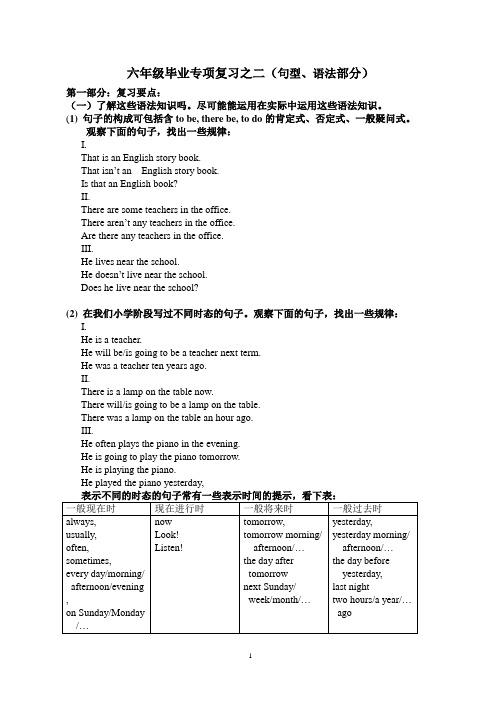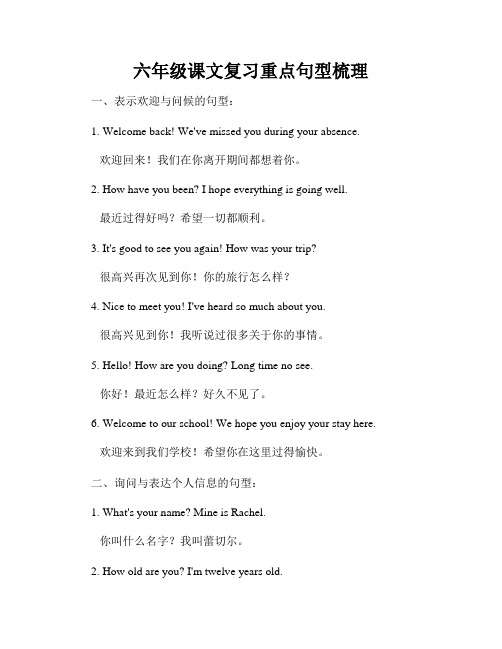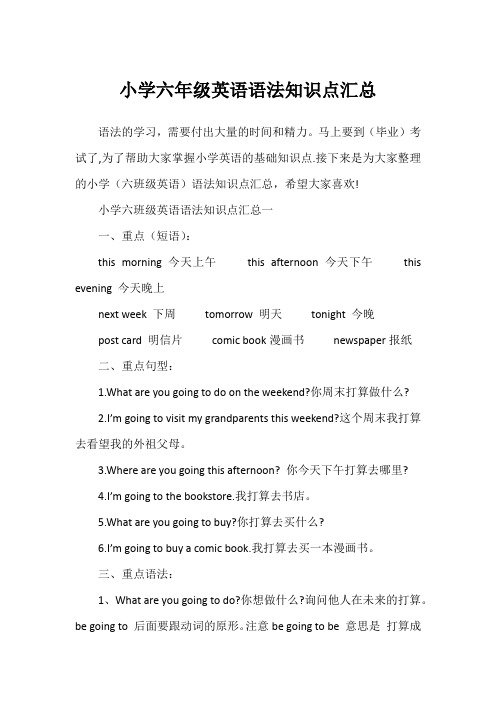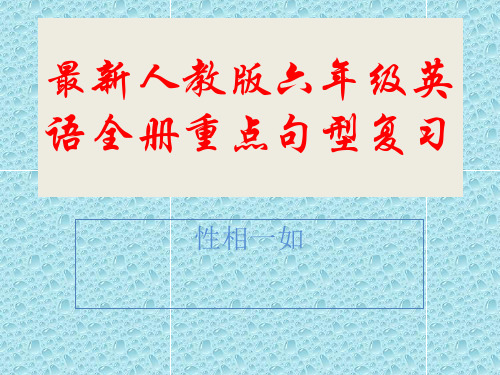小学六年级英语句型总复习_(分类).doc
小学六年级英语语法复习大全汇总(Word版,17页)

小学六年级英语语法复习大全汇总一、名词 (1)二、动词 (4)三、一般过去时态 (7)四、一般现在时 (7)五、现在进行时 (8)六、there be 结构 (8)七、形容词及副词的比较级 (8)八、介词 (8)一、名词名词可以分为专有名词(Proper Nouns)和普通名词(Common Nouns),专有名词是某个(些)人,地方,机构等专有的名称,如Beijing,China等.普通名词是一类人或东西或是一个抽象概念的名词,如:book,sadness等.普通名词又可分为下面四类:1)个体名词(Individual Nouns):表示某类人或东西中的个体,如:gun.2)集体名词(Collective Nouns):表示若干个个体组成的集合体,如:family.3)物质名词(Material Nouns):表示无法分为个体的实物,如:air.4)抽象名词(Abstract Nouns):表示动作、状态、品质、感情等抽象概念,如:work.个体名词和集体名词可以用数目来计算,称为可数名词(Countable Nouns),物质名词和抽象名词一般无法用数目计算,称为不可数名词(Uncountable Nouns)1.1 名词复数的规则变化___________________________________________________情况构成方法读音例词__________________________________________________一般情况加-s 1.清辅音后读/s/;map-maps2.浊辅音和元音后bag-bags读/z/;car-cars___________________________________________________以s,sh,ch,x等结尾的词加-es读/iz/bus-buseswatch-watches___________________________________________________以ce,se,ze,(d)ge等结尾的词加-s读/iz/license-licenses___________________________________________________以辅音字母+y变y 为i结尾的词再加es读/z/baby---babies___________________________________________________1.2 其它名词复数的规则变化1) 以y结尾的专有名词,或元音字母+y 结尾的名词变复数时,直接加s变复数:如:two Marys the Henrysmonkey---monkeys holiday---holidays比较:层楼:storey ---storeys story---stories2) 以o 结尾的名词,变复数时:a. 加s,如:photo---photos piano---pianosradio---radios zoo---zoos;b. 加es,如:potato--potatoes tomato--tomatoesc. 均可,如:zero---zeros / zeroes3) 以f或fe 结尾的名词变复数时:a. 加s,如:belief---beliefs roof---roofssafe---safes gulf---gulfs;b. 去f,fe 加ves,如:half---halvesknife---knives leaf---leaves wolf---wolveswife---wives life---lives thief---thieves;c. 均可,如:handkerchief:handkerchiefs / handkerchieves1.3 名词复数的不规则变化1)child---children foot---feet tooth---teethmouse---mice man---men woman---women注意:与man 和woman构成的合成词,其复数形式也是-men 和-women.如:an Englishman,two Englishmen. 但German不是合成词,故复数形式为Germans;Bowman是姓,其复数是the Bowmans.2)单复同形如:deer,sheep,fish,Chinese,Japaneseli,jin,yuan,two li,three mu,four jin但除人民币元、角、分外,美元、英镑、法郎等都有复数形式.如:a dollar, two dollars; a meter, two meters3)集体名词,以单数形式出现,但实为复数.如:people police cattle 等本身就是复数,不能说a people,a police,a cattle,但可以说a person,a policeman,a head of cattle,the English,the British,the French,the Chinese,the Japanese,the Swiss 等名词,表示国民总称时,作复数用.如:The Chinese are industries and brave.中国人民是勤劳勇敢的.4)以s结尾,仍为单数的名词,如:a. maths,politics,physics等学科名词,为不可数名词,是单数.b. news 是不可数名词.c. the United States,the United Nations 应视为单数.The United Nations was organized in 1945. 联合国是1945年组建起来的.d. 以复数形式出现的书名,剧名,报纸,杂志名,也可视为单数."The Arabian Nights" is a very interesting story-book.<<一千零一夜>>是一本非常有趣的故事书.5) 表示由两部分构成的东西,如:glasses (眼镜)trousers,clothes若表达具体数目,要借助数量词pair(对,双);suit(套); a pair of glasses; two pairs of trousers6)另外还有一些名词,其复数形式有时可表示特别意思,如:goods 货物,waters水域,fishes(各种)鱼1.4 不可数名词量的表示1)物质名词a. 当物质名词转化为个体名词时.比较:Cake is a kind of food.蛋糕是一种食物. (不可数)These cakes are sweet.这些蛋糕很好吃. (可数)b. 当物质名词表示该物质的种类时,名词可数.This factory produces steel.(不可数)We need various steels.(可数)c. 当物质名词表示份数时,可数.Our country is famous for tea.我国因茶叶而闻名.Two teas, please.请来两杯茶.2)抽象名词有时也可数.four freedoms 四大自由the four modernizations四个现代化物质名词和抽象名词可以借助单位词表一定的数量.如:a glass of water 一杯水a piece of advice一条建议1.5 定语名词的复数名词作定语一般用单数,但也有以下例外.1) 用复数作定语.如:sports meeting 运动会students reading-room 学生阅览室talks table 谈判桌the foreign languages department 外语系2) man, woman, gentleman等作定语时,其单复数以所修饰的名词的单复数而定.如:men workers women teachersgentlemen officials3) 有些原有s结尾的名词,作定语时,s保留.如:goods train (货车)arms produce武器生产customs papers 海关文件clothes brush衣刷4) 数词+名词作定语时,这个名词一般保留单数形式.如:two-dozen eggs两打/(二十四个鸡蛋)a ten-mile walk 十里路two-hundred trees 两百棵树a five-year plan.一个五年计划个别的有用复数作定语的,如: a seven-years child 1.6 不同国家的人的单复数名称总称(谓语用复数)一个人两个人中国人the Chinese a Chinese two Chinese瑞士人the Swiss a Swiss two Swiss澳大利亚人the an twoAustralians Australian Australians俄国人the Russians a Russian two Russians意大利人the Italians an Italian two Italians希腊人the Greek a Greek two Greeks法国人the French a Frenchman twoFrenchmen 日本人the Japanese a Japanese two Japanese美国人the Americans an American two Americans印度人the Indians an Indian two Indians加拿大人the Canadians a Canadian two Canadians德国人the Germans a Germans two Germans英国人the English an Englishman twoEnglishmen瑞典人the Swedish a Swede two Swedes1.7 名词的格在英语中有些名词可以加"'s"来表示所有关系,带这种词尾的名词形式称为该名词的所有格,如:a teacher's book.名词所有格的规则如下:1)单数名词词尾加"'s",复数名词词尾没有s,也要加"'s",如the boy's bag 男孩的书包,men's room 男厕所.2)若名词已有复数词尾-s ,只加"'",如:the workers' struggle工人的斗争.3)凡不能加"'s"的名词,都可以用"名词+of +名词"的结构来表示所有关系,如:the title of the song 歌的名字.4)在表示店铺或教堂的名字或某人的家时,名词所有格的后面常常不出现它所修饰的名词,如:the barber's 理发店.5)如果两个名词并列,并且分别有's,则表示"分别有";只有一个's,则表示'共有'.如:John's and Mary's room(两间)John and Mary's room(一间)6)复合名词或短语,'s 加在最后一个词的词尾.如:a month or two's absence二、动词1、动词时态:一般现在时Be型: I用am, you用are, is连着他她它;单数is,复数are. 变否定,很简单,be动词后加not,变疑问,更容易,动词往句首提.一二人称要互换,句末问号莫丢弃,否定疑问任你变,句首大写莫忘记.Do型: 一般现在时很简单,主语总是加动原;除非主语是三单,三单动词有变化;变否定,找动词,动原前面加don’t;动词三单加doesn’t,后面动词改原形;变疑问,找动词,动原句首加上do;如果动词是三单,助动词does句首请;主语紧随在其后,动词改原形莫迟疑.动词第三人称单数变化:①be的第一人称单数形式为am,第三人称单数形式为is,其他人称形式为are.②have的三人称单数为has.③一般动词三人称单数形式是在动词原形后加s或es.加-es的动词规则(注意:名词变复数也是加s或es):①在动词后加s②以s、x、ch、sh结尾的词,若发咝音就加es③以”辅音+o”结尾的词要加”es”,如goes, does, potatoes;以”元音+o”结尾的词,直接加s.④部分以f或fe结尾的名词变复数时要将f变v再加”es”,如knife (knives), wife (wives)一般过去时: 主语+动词过去式+表过去的时间What did +do+过去时间?Did +主语+动词原形+过去时间?动词过去式变化规则:规则变化:①一般在动词原形末尾加ed②词尾e的动词加d③末尾只有一个辅音字母的重读闭音节,先双写这个辅音字母,再加ed④结尾是“辅音字母+y”的动词变y为I,再加ed,如studied.结尾是”元音+y”的动词直接加ed,如played.动词过去式+ed的读音:①在浊辅音和元音后/d/②在清辅音后面/t/③在/t/ /d/ 的音后面发/id/一些不规则动词的变化:am, is (was); are (were); have, has (had); go (went); eat (ate)buy (bought); do (did); ski (skied); make (made) see (saw) leave (left) take (took) study (studied) swim (swam) sing(sang)一般过去时态如何将肯定句变成一般疑问句?①一种是有be动词的,即有was或were,只要把was或were 提到句首, 把句中第一人称转为第二人称,即I, we变you, my和our变your,然后把句中剩下的单词依次抄下来.如:It was a windy day.--Was it a windy day?That was my bag.---Was that your bag?②另一种是无be动词的句子,需要助动词来帮忙.把过去时态的助动词did放在句首,把第一人称改为第二人称,然后把剩下的句子依次抄下来,在抄的过程中,要把动词的过去时转变成原形.如I went fishing yesterday.---Did you go fishing yesterday?例题:按要求改写下列句子John washed the clothes last weekend.What did John do last weekend?(对划线部分提问)John didn’t wash the clothes last weekend. (否定句)Did John wash the clothes last weekend?(一般疑问句)Yes, he did.(肯定回答)No, he didn’t. (否定回答)一般将来时:①主语+be going to+动词原形(或地点)+表将来的时间②shall, will表将来的句子例句:You will like it. 你将会喜欢它.I’m going to be an English teacher. (我想成为一名英语老师)例题练习:I am going to visit my grandparents this weekend.对划线部分提问:When are you going to visit your grandparents ? 否定句:I am not going to visit my grandparents this weekend.一般疑问句:Are you going to visit your grandparents this weekend? 肯定回答:Yes, I am.否定回答:No, I am not.一般现在进行时:(指在某个时刻正在进行某个动作或从事某项活动)句式:主语+be+动词现在分词例题练习:I’m drawing pictures with my friend.对划线部分提问What are you doing with your friend?否定句:I’m not drawing pictures with my friend.一般疑问句Are you drawing pictures with your friend?肯定回答:Yes, I am.否定回答:No, I am not.2、be动词和助动词1. be动词(am/is/are)主语be动词(原形)be动词(过去式)I am was He/she/it is wasWe/you/they are were2.助动词(do/does/did)问句答句Do+非第三人称单数+动词原形…?…do/don'tDoes+第三人称单数…does/doesn'tDid+所有主格…did/didn't问句答句What do you/they/we…+动词原形?I/They/We+动词原形….What does he/she/it…He/She/It +(动词+S)….What did you/they/we/ he/she/it…I/They/We/ He/She/It +动词过去式.(a)be 动词的过去式:I/He/she/it was(not)…. You/we/they were….一般疑问句was, were 放在句首.(b)动词过去式:肯定句:I watched cartoons.She visited the zoo.一般疑问句:Did you read book last night? Yes, I did. No, I didn't. Did she clean the desk just now? Yes, she did. No, she didn't.否定句:They didn't go the the part yesterday.He didn't make model ships last week.(3)动词过去式的变化:规则动词的变化:Most verbs +ed eg. planted,watered,climbed.Verbs ending in e +d eg liked.Verbs ending in a consonant +y --y +ied eg : study-studiedShort verbs ending in a vowel + a consonant eg: stop --stopped不规则动词的变化:is/am-was,are-were,do-did,have/has-had,make-made,fly-flew/u:/eat-ate,take-took,run-ran,sing-sang,drink-drank 等等通常用"usually, often, every day, sometimes".肯定句:I go to school on foot every day.She goes to school on foot every day.一般疑问句:Do you jump high? Yes, I do. / No, I don't.Does he jump high? Yes, he does. / No, he doesn't.否定句:We don't go to school on Sundays.My mother doesn't like watching TV in the evening.五、现在进行时通常用"now".形式:be + verb +ingeg: I am(not) doing my homework.You/We/They are(not) reading.He/She/It is(not) eating.动词-ing 的形式Most verbs +ing walk-walkingVerbs ending in e -e + ing come-comingShort verbs ending in a vowel + a consonant run -running swim-swimming六、there be 结构肯定句:There is a …There are …一般疑问句:Is there …? Yes, there is./ No, there isn't.Are there…? Yes, there are. /No, there aren't.否定句:There isn't …. There aren't七、形容词及副词的比较级1.形容词比较级用于两者比较,基本句式为:(A)主格+be|+形容词比较级+than+B(宾格).2.副词比较级基本句式为:(A)主格+动词|+副词比较级+than+B(宾格).3.比较级的用法:①一般+er②双写最后一个字母+er,如thin-thinner,big-bigger,fat-fatter,hot-hotter,③不规则的比较级:good/well-better,many/much-more,far-farther/further4.一样的情况用as…as,句式为:as 原级as5. 注意:too,very+原级八、介词①in+月、年the morning/afternoon/evening/a week表示时间②on+具体某一天(几月几日)/某个假期(…Day)③at+具体某点时间、某个假期(…Festival)/the weekend ①in…street表示方位②on…road/left/right③at the…crossing/stop/某个具体的地点①in the tree(不是树上长出来的)②on the tree(树上原来自己长出来的)表示时间:①ago(……以前) later(……以后) ②before (在……以前) after(在……以后)。
六年级英语毕业专项复习之二(句型语法部分)

六年级毕业专项复习之二(句型、语法部分)第一部分:复习要点:(一)了解这些语法知识吗。
尽可能能运用在实际中运用这些语法知识。
(1) 句子的构成可包括含to be, there be, to do的肯定式、否定式、一般疑问式。
观察下面的句子,找出一些规律:I.That is an English story book.That isn’t an English story book.Is that an English book?II.There are some teachers in the office.There aren’t any teachers in the office.Are there any teachers in the office.III.He lives near the school.He doesn’t live near the school.Does he live near the school?(2) 在我们小学阶段写过不同时态的句子。
观察下面的句子,找出一些规律:I.He is a teacher.He will be/is going to be a teacher next term.He was a teacher ten years ago.II.There is a lamp on the table now.There will/is going to be a lamp on the table.There was a lamp on the table an hour ago.III.He often plays the piano in the evening.He is going to play the piano tomorrow.He is playing the piano.He played the piano yesterday,(3) 不同时态的句子还有疑问句式和否定句式。
六年级英语下册主要句型复习

六年级英语下册主要句型复习一、陈述句 (Declarative Sentences)陈述句是表达事实、陈述观点和描述事物的句子类型。
在英语中,陈述句的基本结构是主语+谓语+宾语。
下面是一些常用的陈述句句型:1.主语 + 动词原形–He likes to play basketball.–They study English every day.2.主语 + is/am/are + 形容词–She is happy.–They are excited.3.主语 + is/am/are + 名词–He is a teacher.–They are students.4.主语 + 动词过去式–He visited his grandparents last weekend.–They played soccer yesterday.5.主语 + has/have + 过去分词–She has finished her homework.–They have seen that movie.6.主语 + 动词现在进行时–He is watching TV.–They are playing games.7.主语 + has/have + been + 动词-ing–She has been studying English for two hours.–They have been waiting for the bus.二、疑问句 (Interrogative Sentences)疑问句用于提问,以获得信息或确认事实。
在英语中,疑问句通常在句首加助动词或be动词。
以下是一些常见的疑问句句型:1.助动词/Be动词 + 主语 + 动词原形–Do you like ice cream?–Is she going home?2.助动词/Be动词 + 主语 + 形容词–Are you happy?–Is it cold outside?3.助动词/Be动词 + 主语 + 名词–Is he a doctor?–Are they students?4.助动词/Be动词 + 主语 + 动词过去式–Did you finish your homework?–Was she at the party?5.助动词/Be动词 + 主语 + has/have + 过去分词–Have you seen that movie?–Has she finished her project?6.助动词/Be动词 + 主语 + 动词现在进行时–Are you watching TV?–Is she playing games?7.助动词/Be动词 + 主语 + has/have + been + 动词-ing–Have you been studying English for two hours?–Has she been waiting for the bus?三、祈使句 (Imperative Sentences)祈使句用于表达请求、命令或建议。
六年级课文复习重点句型梳理

六年级课文复习重点句型梳理一、表示欢迎与问候的句型:1. Welcome back! We've missed you during your absence.欢迎回来!我们在你离开期间都想着你。
2. How have you been? I hope everything is going well.最近过得好吗?希望一切都顺利。
3. It's good to see you again! How was your trip?很高兴再次见到你!你的旅行怎么样?4. Nice to meet you! I've heard so much about you.很高兴见到你!我听说过很多关于你的事情。
5. Hello! How are you doing? Long time no see.你好!最近怎么样?好久不见了。
6. Welcome to our school! We hope you enjoy your stay here.欢迎来到我们学校!希望你在这里过得愉快。
二、询问与表达个人信息的句型:1. What's your name? Mine is Rachel.你叫什么名字?我叫蕾切尔。
2. How old are you? I'm twelve years old.你几岁了?我12岁。
3. Are you a student? Yes, I am. I go to Westwood Elementary School.你是学生吗?是的,我是。
我在西木小学上学。
4. Where do you live? I live in the Green Meadows neighborhood.你住在哪里?我住在绿草地社区。
5. Do you have any hobbies? Yes, I enjoy playing soccer and painting.你有什么爱好吗?是的,我喜欢踢足球和画画。
小学六年级英语语法知识点汇总1

小学六年级英语语法知识点汇总语法的学习,需要付出大量的时间和精力。
马上要到(毕业)考试了,为了帮助大家掌握小学英语的基础知识点.接下来是为大家整理的小学(六班级英语)语法知识点汇总,希望大家喜欢!小学六班级英语语法知识点汇总一一、重点(短语):this morning 今天上午this afternoon 今天下午this evening 今天晚上next week 下周tomorrow 明天tonight 今晚post card 明信片comic book漫画书newspaper报纸二、重点句型:1.What are you going to do on the weekend?你周末打算做什么?2.I’m going to visit my grandparents this weekend?这个周末我打算去看望我的外祖父母。
3.Where are you going this afternoon? 你今天下午打算去哪里?4.I’m going to the bookstore.我打算去书店。
5.What are you going to buy?你打算去买什么?6.I’m going to buy a comic book.我打算去买一本漫画书。
三、重点语法:1、What are you going to do?你想做什么?询问他人在未来的打算。
be going to 后面要跟动词的原形。
注意be going to be 意思是打算成为什么,干什么职业。
注意一下(句子)的区别,找出正确回答。
What are you going to do this afternoon?What are you going to buy?What are you going to be?When? are you going?Where are you going?How are you going?Who are you going with?2、this evening 和tonight的区别:this evening指的是今天晚上睡觉以前的时间,一般指晚上十二点以前。
人教版六年级英语上册全册重点句型复习

性相一如
1、Where Is the hospital? It’s in front of the cinema.
问路句型
Where is +地点? It’s +表示位置的短语。
2、How can we get there? Turn left at the bookstore.
• Hobbies, are, what, your(?) • What are your hobbies? • Like,she,dancing,does(?) • Does she like dancing? • Live, I, in, Changsha(.) • I live in Changsha. • I,like, reading, stories,also(.) • I also like reading stories.
2、以不发音的字母e结尾,去e加ing • 如make---making,write---writing • 末尾只有一个辅音字母的重读闭音节,双写末
尾辅音字母,再加ing,如stop—stopping, begin--beginning
Does he live in Sydney? No,he doesn’t.
做什么的?
Where does he work? He works at sea .
询问他人的工作地点 Where does +主语(第三人称单数)+work? He/She works +表示地点的介词短语 询问他人上班方式句型及答语 How does +主语(第三人称单数 )+go to work? He/She goes to work +出行方式(by bike , on foot , by bus …)
(完整版)人教版六年级英语下册重点句型语法总结
PEP小学英语重点句型语法总结人教版PEP教材在小学阶段涉及的重要语法知识主要有7种:to be句型、there be句型、一般现在时句型、现在进行时句型、一般过去时句型、情态动词can 引导的句型、be going to句型等,简要总结如下:[一]to be句型:用于介绍个人情况如姓名、健康状况、身份、国籍、家庭成员、朋友、职业等,描述地点、颜色、四季、日期、星期几等1. Who ' s your English teacher? Mr. Carter.2. What ' s he likeHe' s tall and strong.3. Is she quiet? No, she isn She is very active.4. Is she strict? Yes, she is, but she ' s very kind.5. What day is it today? It ' s Wednesday.6. What ' s your favourite fruit/food …?7. They ' re sweet/ sour/ salty/ healthy/ …8. When is your birthday? It ' s in May.9. My birthday is in June. Uncle Bill ' s birthday is in June, too.10. Is her birthday in Jun e? Yes, it is.11. What ' s the date?12. This is Zhang Peng.13. Where is the cinema, please? It ' s next to the hospital.14. How tall are you ? I ' m 164 cm tall.15. You are shorter tha n me.16. You ' re 4 cm taller than me.17. How heavy are you? I ' m 48 kg.18. I ' m thinner than you, and shorter.19. What ' s the matter with you?My throat is sore.20. How are you, Liu Yun / Sarah?[二] there be句型:表示存在,即:某处有某物"或某时有某事”。
六年级上册英语所有固定句型
六年级上册英语固定句型知识点总结归纳一、日常交际用语1. 问候Good morning/afternoon/evening. Hi/Hello, [name].How are you?Fine, thank you. And you?2. 告别Goodbye/Bye.See you later.Have a good day!3. 感谢与应答Thank you.You're welcome.Thanks a lot.Don't mention it.4. 道歉与应答I'm sorry.That's OK.It doesn't matter.5. 请求帮助Can you help me, please?Sure, what do you need?6. 表达意愿I'd like to...I want to...二、基本句型结构1. 陈述句肯定句:I like apples.否定句:I don't like apples.2. 一般疑问句Do you like apples?Yes, I do. / No, I don't.3. 特殊疑问句What do you like?I like apples.4. 祈使句Please close the door.Don't forget your homework.5. There be句型There is a book on the table. There are two apples in the basket.三、重点固定句型1. 询问姓名What's your name?My name is [name].2. 询问年龄How old are you?I'm [age] years old.3. 询问职业What do you do?I'm a [occupation].4. 询问爱好What are your hobbies?I like [hobby].5. 询问地点Where is [place]?It's near [another place].6. 询问时间What time is it?It's [time].7. 询问数量How many [nouns] are there? There are [number] [nouns].8. 询问价格How much is it?It's [price].9. 询问颜色What color is it?It's [color].10. 询问食物和饮料What would you like to eat/drink? I'd like [food/drink].11. 询问做某事的能力Can you [verb]?Yes, I can. / No, I can't.12. 询问周末活动What do you do on the weekend?I usually [activity].13. 谈论日常活动What do you do in the morning?I usually [activity].14. 谈论喜欢的科目What's your favorite subject?My favorite subject is [subject]. 15. 谈论天气What's the weather like today?It's [weather condition].16. 提出建议Let's [verb].That sounds good.17. 谈论过去的事件Did you [verb] last weekend?Yes, I did. / No, I didn't.18. 谈论未来的计划Are you going to [verb] this weekend? Yes, I am. / No, I'm not.四、例句1. 询问姓名与回答—What's your name?—My name is Alice.2. 询问年龄与回答—How old are you?—I'm ten years old.3. 询问职业与回答—What do you do?—I'm a teacher.4. 询问爱好与回答—What are your hobbies?—I like reading books.5. 询问地点与回答—Where is the park?—It's near my house.6. 询问时间与回答—What time is it?—It's 8:30.77. 询问数量与回答—How many apples do you have?—I have five apples.8. 询问价格与回答—How much is this book?—It's twenty dollars.9. 询问颜色与回答—What color is your car?—It's blue.10. 询问食物与饮料喜好与回答—What would you like to eat?—I'd like a hamburger and fries.11. 询问做某事的能力与回答—Can you play the piano?—Yes, I can. I've been learning for years.12. 询问周末活动与回答—What do you do on the weekend?—I usually go hiking with my family.13. 谈论日常活动与回答—What do you do in the morning?—I usually brush my teeth, eat breakfast, and then go to school.14. 谈论喜欢的科目与回答—What's your favorite subject?—My favorite subject is science. I love experiments!15. 谈论天气与回答—What's the weather like today?—It's sunny and warm. Perfect for a picnic!16. 提出建议与回应—Let's go to the movies this weekend.—That sounds like a great idea! I'll bring the popcorn.17. 谈论过去的事件与回答—Did you visit your grandparents last weekend?—Yes, we did. We had a great time!18. 谈论未来的计划与回答—Are you going to learn a new language this year?—Yes, I am. I'm thinking about learning Spanish.五、其他常用句型1. 表达感谢Thank you for [something].You're welcome.2. 道歉与回应I'm sorry for [apologizing for something].It's OKAY. / Don't worry about it.3. 表达喜好I like [noun/activity].Me too! / I like it too.4. 表达不喜欢I don't like [noun/activity].Oh, really? What do you like instead?5. 表达惊讶Wow! That's amazing!Thanks. I'm glad you think so.6. 表达同意与不同意I agree with you.I disagree. I think [your opinion] is wrong.六、总结以上是关于六年级上册英语的主要固定句型知识点总结归纳,涵盖了询问信息、表达个人喜好、谈论日常生活、提出建议、谈论未来计划等多个方面。
小学六年级下册英语句型.doc
小学六年级下册英语句型一、一般陈述句1、b e结构(is ,am ,are)的一般陈述句:主语+谓语(be)+宾语例子:I am a student.You are a boy.He (She, It) is smart.2、由动词构成的一般陈述句:主语+谓语(动词:时态)例子:I often swim in the lake.(一般现在式)I am swimming in the lake now.(现在进行式)I swam in the lake yesterday. (过去式)I will swim in the lake tomorrow. I am going to swim in the lake next week.(将来式)He swims in the lake.(一般现在式)He is swimming in the lake now.(现在进行式)He swam in the lake yesterday. (过去式)He will swim in the lake tomorrow. He is going to swim in the lake next week. (将来式)3、由there be构成的一般陈述句:there+be例子:There is a man in the room.There are many students in the room.二、否定句1、由be结构(is ,am ,are)的一般否定句:主语+谓语(be)+not+宾语I am not a student.You are not(aren't) a boy.He (She, It) is not(isn't) smart.2、由动词构成的否定句:主语+谓语的否定式(动词:时态)I don't often swim in the lake.(一般现在式)I am not swimming in the lake now.(现在进行式)I didn't swim in the lake yesterday. (过去式)I will not swim in the lake tomorrow. (将来式)I am not going to swim in the lake next week.He doesn't swim in the lake.(一般现在式)He is not swimming in the lake now.(现在进彳亍式)He didn't swim in the lake yesterday. (过去式)He will not swim in the lake tomorrow. (将来式)He is not going to swim in the lake next week.3、由there be构成的一般否定句:there+be+notThere is not(isn't) a man in the room.There are not(aren't) many students in the room.三、一般疑问句1、b e 结构(is ,am ,are)I am a student. Are you a student? Yes, I am. No, I am not.You are a boy. Are you a boy? Yes, I am. No, I am not.He (She, It) is smart. Is he (she, it) smart? Yes, he (she, it) is. No, he (she, it) isn't.2、动词I often swim in the lake. Do you often swim in the lake? Yes, I do. No. I don't.I am swimming in the lake now.Are you swimming in the lake now. Yes, I am. No, I am not.I swam in the lake yesterday.Did you swim in the lake yesterday? Yes, I did. No. I didn't.I will swim in the lake tomorrow.Will you swim in the lake tomorrow? Yes, I will. No, I won't.I am going to swim in the lake next week.Are you going to swim in the lake next week? Yes, I am. No, I am not..He swims in the lake. Dose he swim in the lake. Yes, he dose. No, he doesn't.He is swimming in the lake now.Is he swimming in the lake now? Yes, he is. No, he isn't.He swam in the lake yesterday.Did he swim in the lake yesterday? Yes, he did. No. he didn'tHe will swim in the lake tomorrow.Will he swim in the lake tomorrow? Yes, he will. No, he won't.He is going to swim in the lake next week.Is he going to swim in the lake next week? Yes, he is. No, he isn't..3、there be 结构There is a man in the room.Is there a man in the room? Yes, there is. No, there isn't.There are many students in the room.Are there many students in the room? Yes, there are. No, there aren't.四、特殊疑I可句(what、who、whose、which、when、where、how、why等特殊疑问词开头的疑问句)。
(人教PEP)六年级英语下册复习资料 全册句型总结
(人教PEP)六年级英语下册拓展资料英语句型汇总1. May I have a look? Sure. Here you are.2. My friend is strong.3. He has short hair and big eyes.I like music. He likes sports.4. Is she in the living room?No, she isn’t. Yes she is.5. Where are the keys?Where is your book?6. What would you like?I'd like some rice and soup.7. What would you like for dinner?8.What's your father? My father is a doctor.9. What do you do? I'm a policeman.10. What do you do on the weekend? I often go hiking.11. What’s your favourite season?Spring.12. What’s your favourite fruit? I like apples. I don't like grapes.13. Who are they? Who's this man? He's my uncle.14. When do you get up? I usually get up at 6:00.15.Sometimes I visit my grandparents.16. Why do you like spring? Because I can plant trees.17. Which season do you like best? I like winter best.18. When is your birthday? My birthday is in July.It's July 4th.19. When is Teachers' Day? It's September 10th.20. Who has a birthday in October? Me.21. Is her birthday in June? Yes.22. What’s the date? June 9th.23. What are you doing? I'm drawing pictures.24. What is your father doing? He's writing an e-mail.25. What do you see? I see two elephants.26. What are they doing? They are drinking water.27. What is Mike doing? He's watching insects.28. Where are they? They are in the woods.29. Are they catching butterflies? No, they aren't.30. They are picking up leaves. Yes, they are.31. Where is Zhang Peng? He's in the woods.32. Is he taking pictures? Yes, he is. No, he isn't. He's playing chess.33. who’s your English teacher?Mr. Carter.34. What’s he like? He's tall and strong.35. Is he quiet? No, he isn't. He's very active.36. What day is it today? It's Wednesday.37. What do you have on Thursdays?We have English, math and science on Thursdays.38. What do you do on Saturdays?I watch TV on Saturdays.39. What do you have for lunch on Mondays?We have tomatoes, tofu and fish.40. What can you do? I can sweep the floor.41. Can you make the bed? NO, I can't. Yes, I can42.There are two bedrooms, a kitchen, a bathroom and a living room.43. There is a mirror, a bed and a big closet.44. Is there a forest in the park?Yes, there is. No, there isn't.45. Are there any pandas in the mountains?No, there aren't.46. Are there any fish in the rivers?Yes, there are.47. Where is the canteen?It's on the first floor.48. What time is it?It's 5 o'clock. It's 6:30.49. It’s time to go to school.It's time for English.50. What colour is it? It's blue.51. Whose is it? It's my T-shirt.52. What’s the weather like in Beijing?It's rainy today.53. who’s that woman? She's my mother.54. Do you like peaches? Yes, I do. No, I don't.55. Nice to meet you. Nice to meet you, too.56. I have a bear. May I have a look? Sure. Here you are.57. Where is the cinema? It's next to the hospital.58. Turn left at the cinema, then go straight.It's on the left.59. What are you going to do on the weekend?I'm going to visit my grandparents this weekend.60. Where are you going this afternoon?I'm going to the bookstore.61. What are you going to buy?I'm going to buy a comic book.62.What's your hobby? I like collecting stamps.63. Does she teach English?No, she doesn't. Yes, she does.64. What does your mother do? She is a TV reporter.65. Where does she work? She works in a car company.66. What should you do then?。
- 1、下载文档前请自行甄别文档内容的完整性,平台不提供额外的编辑、内容补充、找答案等附加服务。
- 2、"仅部分预览"的文档,不可在线预览部分如存在完整性等问题,可反馈申请退款(可完整预览的文档不适用该条件!)。
- 3、如文档侵犯您的权益,请联系客服反馈,我们会尽快为您处理(人工客服工作时间:9:00-18:30)。
半評语主要句型归类(三年级上册―六年级一、询问姓名、年龄。
1,-…What's your name? -…你叫什么名字?——My name is ______ ・・■一我UL| .2,-…How old are you? -…你几岁了?-—rm 12. •…我I •二岁。
二、询问颜色。
1,-…What colour is it? -…它是什么颜色的?-…It's yellow and white.・…黃白相间。
2,・…What colour are they?-…它们是什么颜色的?-…They're green. -…绿色的。
三、询问数量或价钱。
1,-…How many kites can you see? -…你可以看见几只风筝?-…I can see 12. ・…我可以看见十二只风筝。
2,-…How many crayons do you have? -…你有多少支彩笔?——I have 16. -…我有十六支。
3,・…How many people are there in your family?-…你家有几口人?——Three. ・■一三口人。
4,-…How much is this dress? -…这条连衣裙多少钱?-■一It's ninety-nine yuan. -■一九I 九沅;。
5,-…How much are these apples? -…这些苹果多少钱?-■一They're thirty-five yuan. ■■一三十五;/匸。
四、询问时间或日期。
1,——What time is it now? ・…现在几点钟?—It's nine o'clock.. It's time for English class.-…九点。
该上英语课了。
(-…It's eight o'clock. It's time to go to bed.) (-■一八点。
该上床睡觉了。
) 2,・…What day is it today? ・…今天星期几?——It9s Monday. ■…星期一。
(——What do we have on Mondays?・・・・We have Chinese, English, math ...) 3,・…When is your birthday?(…•我们星期一上哪些课? ■…语文、英语、数学…•…你的生日是什么吋候?6,——Where does the rain come from? -…雨是从哪儿来的?-…It comes from the clouds ・・…它是从云层里来的。
六、询问想吃的东西。
1, ——What would you like for breakfast / lunch / dinner ?-…你早餐/屮餐/晚餐想吃 点什么?――Fd like some bread and milk / rice and soup.-…我想吃面包和牛奶/米饭和汤。
2,——What's for breakfast / lunch /dinner?■…早餐/中餐/晚餐吃什么? -…Hamburgers and orange juice.・…汉堡包和橙汁。
七、 询问天气状况。
1, •…Whafs the weather like in Beijing? •…北京的天气如何? -…It's rainy today. How about New York? ■…今天是雨天。
纽约呢?-…Ifs sunny and hot.-…今天是晴天,天气很热。
八、 询问身体状况或情绪。
1, -…How do you feel?-…你感觉如何?——It's October 1st, our National Day. 4, ——When do you do morning exercises? ——I usually do morning exercises at 8:30.五、询问方位或地方。
1, ——Where is my toy car?・■一It's here, under thechai 匚2, ・■一Where is the canteen?・■一It's on the first floor. 4, -■一Excuse me. Where is the library, please?・■一It's near the post office.5, -■一Where are you from?•…十月一日,国庆节。
--你们什么吋候做早锻炼? 一我们通常& 30做早锻炼。
■■我的玩具汽车在哪儿? 在这儿,在椅子下面。
餐厅在哪儿? 在一楼。
钥匙在哪儿? 在门上。
对不起,请问图书馆在哪儿?••在邮局附近。
•…你从哪儿来? ・■一Pm from China. ■…我从中国来。
-…I feel sick. ・…我觉得不舒服。
2,——What's the matter? -…怎么了?——My throat is sore. / I have a sore throat. -…我的喉咙疼。
3,・…How are you, Sarah? You look so happy. ——你好吗,莎拉?你看起来这么伤心。
-…I failed the math test. -…我的数学考试没有通过。
九、询问职业、身份或人物。
1,■…What\ your father / mother? ・…你的父亲/母亲是做什么的?-…He's a doctor. / She's a teacher. ・…他是一名医生。
/她是一名教师。
2,■…What does your mother / father do?-…你的母亲/父亲是做什么的?-・・・She's a TV reporte匚 / He's a teache匚He teaches English.•…她是一名电视台记者。
/他是-•名教师。
他教英语。
3,・…Who^ that man / woman? -…那位男士 /女士是谁?-…He's my father. / She's my mothe匚-…他是我父亲。
/她是我母亲。
4,…・Who,s this boy / girl? ―那个男孩儿/女孩儿是谁?-…He's my brother. / She's my sister*. -…他是我兄弟。
/她是我姐妹。
5,-…Who's your art teacher? -…你们的美术老师是谁?-—Miss Wang. -…王老师。
-…What's she like? -…她长什么样儿?——She's young and thin. ■…她很年轻、苗条。
十、询问兴趣、喜好。
1,——What5s your favourite food / drink? ■…你最喜欢的食物/饮料是什么?-■一Fish / orange juice. -■一A。
/ 橙汁。
2,・…What's your favourite season? ・…你最喜欢的季节是什么?——Winte匚・■一冬天。
(-…Which season do you like best? (-…你最喜欢哪个季节?・——Winter.)-——冬天。
)-…Why do you like winter? -…你为什么喜欢冬天?-…Because I can make a snowman. -…因为可以堆雪人。
3,・…What's your hobby? ・…你的爱好是什么?-…I like collecting stamps. ・…我喜欢集邮。
-…What's his hobby? ・■一他的爱好是什么?——He likes riding a bike. -…他喜欢骑自行车。
4,-…Do you like peaches? ■…你喜欢吃桃子吗?-—Yes, I do. / No, I don't. -—善欢。
/ 不善欢。
I一、询问平时一般或通常做的事情。
1,-…What do you do on Saturdays / on the weekends? …■你星期六 / 周末一般做什么?――I usually do niy homework. Sometimes I play football.・…我通常'做作业,有吋候 踢足球。
1,——What are you going to do? -…你准备做什么? -…Pm going to the cinema. -…我准备去看电影。
——When are you going to do? -…你准备什么时候去? -—This afternoon.-…今天下午。
2,——Where are you going this afternoon?-…今天下午你准备到哪儿去?-—rm going to the bookstore.——What are you going to buy?-—rm going to buy a comic book. 十四、询问曾经做过或发生过的事情1、 Where did you last weekend ?I went to Beijing ・ 2、 How did you go there?I went by train. 3、 What did you do there?I wnet shopping.•…我准备到书店去。
•…你打算买点儿什么?•…我准备买木漫画书。
你上周末到哪儿去了?我去北京了。
你怎么去的? 我乘火车去的。
你在那儿做了些什么? 我去购物了。
I •二、询问正在做的事情。
1, ——What are you doing? ——Fm doing the dishes- 2, ——What's your father doing? ——He's writing an e-mail. 3, -…What's Mike doing? ——He 5s watching insects. 4, ——What's the tiger doing? ——It ,s running.5,——What are the elephants doing? -…你在做什么? •…我在洗盘子。
•…你父亲正在做什么? •…他正在写电子邮件。
•…迈克正在干什么? …■他正在观察昆虫。
